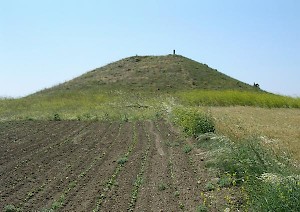Plutarch on Alexander's visit to Troy
Alexander the Great (*356; r. 336-323): the Macedonian king who defeated his Persian colleague Darius III Codomannus and conquered the Achaemenid Empire. During his campaigns, Alexander visited a.o. Egypt, Babylonia, Persis, Media, Bactria, the Punjab, and the valley of the Indus. In the second half of his reign, he had to find a way to rule his newly conquered countries. Therefore, he made Babylon his capital and introduced the oriental court ceremonial, which caused great tensions with his Macedonian and Greek officers.

In May 334, Alexander invaded Asia. The first town he reached was Troy, where he brought sacrifices to the homeric heroes, which he considered his ancestors. It was more than just a pious act, however: by visiting this pace, he presented his campaign as part of the quasi-eternal chapter between Europe and Asia. (Spartan king Agesilaus had done the same.) Archaeologist have established that the ancient funeral mounds on the Trojan plain were restored in this age.
The Greek author Plutarch of Chaeronea describes the events in section 15 of his Life of Alexander. The translation was made by M.M. Austin.
Alexander's visit to Troy
[15.7] Alexander went up to Troy, sacrificed to Athena and poured a libation to the heroes.
[15.8] At the tomb of Achilles, after anointing himself with oil and taking part in a race naked with his Companions, as is the custom, he deposited crowns and remarked how fortunate Achilles was to have had a faithful friend while he was alive and a great herald of his fame after his death.
[15.9] While he was going sightseeing about the town someone asked him whether he wanted to see the lyre of Alexander;note he replied that he was not interested in that one, but was looking for the lyre of Achilles, to which he used to sing the glorious deeds of brave heroes.